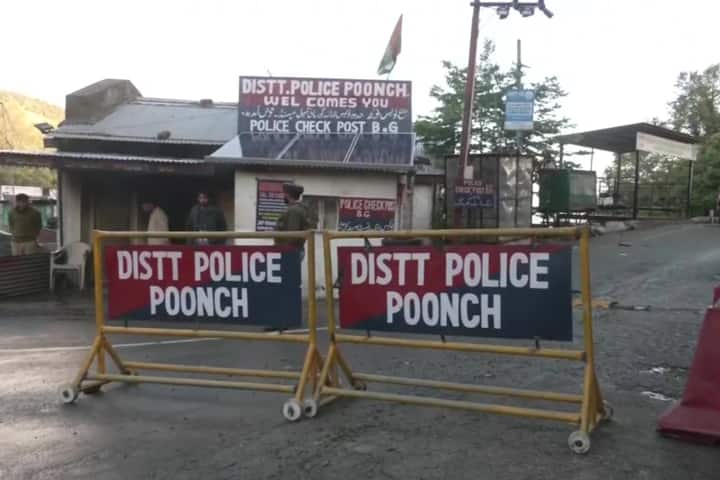At around 3:00 pm on Thursday, 20 April, a military vehicle caught fire on a road in Bhatti Dhrurrian Forest area of Bhimber Gali, close to the LoC, in Jammu’s Poonch district. Initially there were reports of three fatal casualties in a ‘lightning strike’. By 5:00 pm, the toll was confirmed as five. Videos of a vehicle in flames went viral on social media.
In the evening, Udhampur-based Northern Command headquarters confirmed that it was a terror strike in which automatic rifles and hand grenades had been used, resulting in the death of five soldiers. One injured soldier was evacuated to a hospital. The Army spokesman said that the terrorists vanished with the advantage of bad weather and poor visibility. A major search operation was launched after reinforcement reached the spot.
With the officials trying to find out the terror outfit involved in the attack, ‘Peoples Anti-Fascist Front’ (PAFF) prepared and circulated a video meme on the Indian television reports which initially called it a ‘lightning strike’. The PAFF, according to Police, is a front for Pakistan-based jihadist terror group Jaish-e-Mohammad (JeM).
The militant propaganda channels in Pakistan flashed that the ‘hypocrite enemy has been shattered from Jammu to Delhi’. They said the Indian Defence Minister Rajnath Singh had taken an emergency briefing of the Army chief. These channels in Urdu celebrated that the attack had spread “fear among the Hindutva terrorists from Srinagar to Jammu and Poonch to Kargil”.
These regular and social media reports from Pakistan made it clear that the JeM cadres had executed the attack which significantly occurred in months of Islamabad getting a relief in the Financial Action Task Force (FATF) and days ahead of a G20 meeting in Srinagar. A number of Y20 events, part of the G20 summit, are currently going on across India, including the Union Territories of Jammu and Kashmir and Ladakh. Thursday’s strike in Poonch happened in 24 hours of a Y20 event at the University of Jammu.
Early this month, Pakistan’s Ministry of Foreign Affairs issued a statement, raising objections and condemning India’s decision to hold the G20 and Y20 events in J&K and Ladakh. Pakistan’s objections were rejected by New Delhi, asserting that holding such events in the two UTs was “natural” as both were sovereign constituents of the Indian Union like all other States and UTs. The statement, however, betrayed intentions and indications of sabotage.
The Union Home Minister Amit Shah called Lieutenant Governor Manoj Sinha to New Delhi and presided over a high-level meeting regarding the security arrangement related to the G20 events. A day before, Union Home Secretary Ajay Kumar Bhalla held a meeting on the same agenda with J&K’s top brass of bureaucracy and Police, besides other security and intelligence agencies. Sources privy to the deliberations insist that some intercepts and inputs indicating the possibility of some ‘news making terror attacks’ were discussed in the two meetings.
Thursday’s attack in Poonch came after a chain of terror strikes and encounters in Jammu in the last two years. The G20 event in Srinagar being the first major international gathering in J&K after the erstwhile State’s reorganisation and annulment of Article 370—also the first after an international cricket match in 1983—attempts of sabotage are duly feared and predicted. All the major world economic and military powers, as also several Islamic countries, are members of G20 and expected to be represented in Srinagar.
Even as the insurgency has been brought down to its lowest ebb in Kashmir, Jammu has been retained in news for a series of terror strikes and encounters. A number of infiltrating guerrilla groups have been intercepted and eliminated in several encounters on the Jammu-Srinagar highway in the last 2-3 years. Terror cadres have been found sneaking into the UT through tunnels. Drones have been detected and brought down while delivering drugs, arms and ammunition on the International Border.
In a terror attack on a bus of the Mata Vaishno Devi pilgrims, four persons were killed and 24 left injured near Katra in May 2022. Around a dozen terror incidents were reported in Udhampur, Jammu and Rajouri. In several investigations, the National Investigation Agency (NIA) has established the involvement of JeM and Lashkar-e-Tayyiba (LeT).
The border districts of Rajouri and Poonch have witnessed remarkable terror activity striking soft targets over the last two years—even as it has failed to instil fear among the common people.
On January 1-2, 2023, terrorists left seven civilians—all Hindus—dead and over a dozen injured in twin attacks at village Dhangri in Rajouri. A fortnight before, two non-J&K workers were killed on the perimeter of an Army camp at Rajouri. On 8 February, 2023, the J&K Police issued an audio advisory, warning residents against providing shelter to the killers and announcing cash reward of Rs 10 lakh to anybody helping in their arrest.
In total there have been five major strikes in Rajouri-Poonch belt, resulting in security forces maintaining utmost vigilance, particularly in Jammu, ahead of the G20 events.
Also Read: In Rajouri-Poonch, Muslims spearhead People’s resistance to Pak-sponsored terror




















